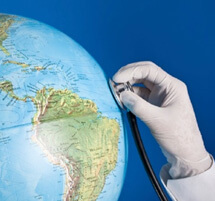Non-Traditional Career Paths for LPNs and LVNs

When people choose to begin careers as licensed practical or vocational nurses, the majority of them typically follow career paths leading to traditional forms of employment. However, there are several exciting non-traditional career paths you may elect to follow as a newly-graduated LPN or LVN, and you can find a sample of them described below.
Early-Education, Primary, and Secondary Schools
As a school nurse, you can choose to work in pre-schools, kindergartens, or schools on the elementary, middle or high school level. Although most of your responsibilities as a school nurse will involve working with children, there may be times when you will need to provide medical care or assistance to adults as well. If you choose this career path, some tasks you may be responsible for are as follows:
- Administering First Aid and CPR
- Ensuring Children Take Doctor Prescribed Medication
- Handling Allergic Reactions
- Educating Children and Parents on Various Health Issues
- Counseling Emotionally-Troubled Children
- Referring Children to Local Medical Facilities
Plasma Donation Centers
Another great non-traditional career path you may enjoy as an LPN or LVN is that of a plasma donation center nurse. Nurses who work in plasma donation centers are mainly responsible for conducting initial and yearly physical examinations on prospective and regular donors. However, they may also be responsible for the following tasks:
- Performing Drug Screenings
- Conducting HIV Tests
- Checking and Recording Vital Signs Prior to Donations
- Handling Medical Emergencies
- Referring Donors to Local Medical Facilities
Clinical Research Facilities
There are many clinical research facilities that require the services of LPNs or LVNs to help conduct their studies. The most common types of facilities in this category are pharmaceutical companies that are testing the effectiveness and potential side effects of new medications. As a pharmaceutical research nurse, some of the duties you may need to perform each day are:
- Helping to Identify Ideal Participants for Research Studies
- Drawing Blood for Laboratory Analysis
- Collecting Other Bodily Samples for Lab Analysis
- Taking and Recording Vital Signs Before and After Medication Administration
- Recording Changes in Participants' Physiology and Behavior
- Monitoring Dietary Plans
Manufacturing Companies
If you want to choose a non-traditional career path as an LPN or LVN, you may also want to consider becoming an occupational health nurse. The majority of these nurses are typically employed by manufacturing companies that pose high risks for accidents or injuries on the job. Nurses in these types of work environments are commonly responsible for the following tasks:
- Educating Employees on Workplace Safety
- Implementing Occupational Health Programs
- Helping to Improve Workplace Safety
- Administering First Aid and CPR
- Counseling Employees
- Conducting Crisis Interventions
- Referring Employees to Local Medical Facilities
Summer and Wilderness Camps
Finally, many summer and wilderness camps employ LPNs or LVNs to handle any emergencies that campers may experience. While this commonly involves just minor accidents and injuries, camp nurses must be prepared to handle serious emergencies as well. If you choose this career path, some of the duties you may need to perform on a daily basis include:
- Cleaning and Bandaging Wounds
- Administering Other Types of First Aid
- Administering Bee Sting Kits
- Handling Other Allergic Reactions
- Administering Non-Prescription Medications as Necessary
- Referring Campers to Local Medical Facilities When Necessary




